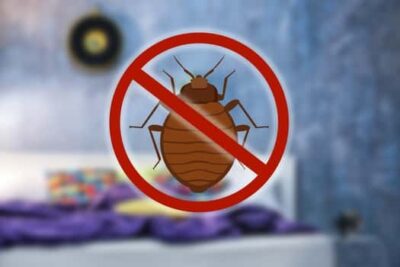In a perfect world, hiring an exterminator would be the end of any bed bug infestation. But even following the most thorough treatment, you might still have to wait for weeks for all the bed bugs to die. And even worse, there’s going to be lots of unpleasant cleaning for you to do.
If you hired an exterminator, and they used pesticide, it can take weeks for bed bugs to die. The same applies if you use your own pesticide spray. However, if your exterminator used a heat treatment, all the bed bugs should die very quickly.
Cleaning after bed bug treatment is crucial. You have to vacuum and clean thoroughly to get rid of all the dead bed bugs, but you’re not supposed to do this straight away. And on top of that, laundering clothes and bedsheets—all of them—is highly recommended too.
What Happens After Bed Bug Treatment?
Most people live with bed bugs for quite a while before they seek a solution. There may be an element of denial, or embarrassment for example that prevents them from trying to tackle the problem. When they start to treat their bed bug problem, they expect it to go away overnight.
It’s crucial that you tailor your expectations before you commence treatment. If you’re using a spray that you bought or made yourself, it can only kill bed bugs gradually. That’s because sprays usually work on contact, and it’s virtually impossible to find and spray every single bed bug.
This applies just as much to hiring an exterminator as it does to treat them yourself. Bed bugs are rapidly becoming more immune to the pesticides that pest controllers use. Even hiring a PCO might not be enough to kill all of your bed bugs.
Will You See Bed Bugs After Treatment?
You should expect to see lots of bed bugs after treatment. There won’t necessarily be any more or any less, straight away. Most treatments take time to work.
Pest controllers usually use sprays to control bed bugs. Depending on the brand of the spray, the concentration at which it’s used, and the active ingredients, the time it takes to kill bed bugs varies.
Talk with your PCO and ask them for an estimate on how long it will take. Whatever happens, there will be eggs that have to hatch and then die for the infestation to disappear completely.
This doesn’t apply to heat treatments. Effective heat treatment will kill every bed bug in the course of just a few hours. And the majority of that time is spent getting the temperature high enough.
Once the inside of furniture, mattresses and bed frames reach 122 degrees, bed bugs die within minutes. You shouldn’t expect to see any bed bugs after heat treatment.

How Long After Bed Bug Treatment Can I Return Home?
Heat treatment requires that you leave your home for around six hours. To be clear, that’s not because the heat treatment is dangerous for you. It would just be very uncomfortable.
Before you hire an exterminator, ask them to clarify how long heat treatment is likely to take so that you know beforehand.
If you return too soon after a spray, it can be detrimental to your health. That’s because the concentration and volume of pesticide that exterminators use can be bad for you. That’s why pest controllers wear masks when they work, to prevent damage to their health.
You are supposed to wait for between two to four hours before you go back into your home. During this time, the pesticide settles into the carpet, furniture, and bedding.
If you’re not sure about any aspect of the process, or you want to know more about the health damage that pesticides can cause, talk to your exterminator before they spray your home.
Cleaning After Bed Bug Treatment
After your exterminator has done their thing, you can have your home back. Ask them how long it will be until you can go back indoors again, and listen to their advice. When you do go back inside, open the windows and allow air to flow through your house or apartment for an hour at least.
Start by laundering clothes and bedsheets. Take the bedding from your bed, and any clothes from your wardrobe, and launder them at high heat. Dry them at high heat, too.
This will be enough to kill any residual eggs, or any bed bugs that might have avoided the spray. There aren’t likely to be many, but your efforts here could prove all the difference.
Do you have to wash everything? No, but you should. Bed bugs lay their eggs in hidden cracks and crevices, which usually means furniture, but can mean stacks of clean towels or the back of your wardrobe. You should wash everything you possibly can, to be sure.
You could also start your own DIY bed bug treatment, whether or not your exterminator managed to get rid of them all. Doing it yourself is cheap and easy, and could prevent them from coming back. You can use regular cleaning products and homemade sprays to kill bed bugs too.
Should You Vacuum After Bed Bug Treatment?
Don’t vacuum clean immediately after your exterminator finishes their work. The pesticides they use will stick to surfaces like carpets and bedding for weeks afterward. This residual effect helps to eliminate your infestation, so don’t vacuum straight away.
Do DIY Bed Bug Treatments Work?
If you can’t afford an exterminator, you can try and get rid of bed bugs on your own. However, you have to be aware that DIY bed bug treatments are typically less effective, and take longer to work.
How Does DIY Bed Bug Treatment Work?
There are ways to treat bed bugs on your own. The first is to use sprays you can buy, like sprays for cockroaches. These sprays contain the same things your exterminator’s spray does.
You spray it on surfaces where you’re likely to find bed bugs, i.e., under your mattress and nearby furniture. Aside from that:
- You can fit a mattress encasement, which stops bed bugs from getting in your mattress
- You can use traps and lures to pick them up when they’re trying to find you to feed
- You can use diatomaceous earth, a fine powder that kills on contact
If you use each of these methods, you will start to make a real dent in your bed bug population. And if you use them after your exterminator did their job, then you will prevent them from coming back, and kill off any that are left.
How Long Until DIY Treatment Kills Bed Bugs?
Bed bug treatment can take a long time. Insects took a look at the effectiveness of a variety of DIY sprays that you can buy. One, Temprid SC, contains pyrethroids and neonicotinoids which are both insecticidal. The other was an essential oil spray called EcoRaider.
Both treatments took a long time to work. The study’s figures show that after two weeks, Tempris SC had hardly had any effect.
The mean bed bug count in the group of apartments they studied stayed the same at about 60. EcoRaider worked a little better, but only cut the mean bed bug count from 70 or so to about 45.

After six weeks, both sprays reduced the count to 30. After six weeks, there was only a slight reduction. It was only at twelve weeks that the mean count for both sprays was reduced to single digits. What that means is that there were still a few bed bugs, although far fewer than there were.
Aside from that, there’s the chance that bed bugs are continually invading your property. Say for example that they’re coming from a neighbor’s apartment.
Even with the best treatment money can buy, you’re going to have bed bugs indefinitely unless you fill in the cracks that those bed bugs are getting through.
How Long After Bed Bug Treatment Can I Return Home?
If you’re doing your own bed bug treatment, then you don’t need to leave. The sprays that you can buy to use at home don’t require you to leave your home.
You can usually use them and stay in your house as you do. However, be sure to check the spray can to make sure that you’re allowed to.
One exception is the bed bug bomb. These are fumigating sprays that you leave to spray for half an hour or an hour on their own. With these sprays, you do have to leave the house, usually for an hour or so. Again, check the label to make sure.
Bed Bugs Worse After Treatment
If your bed bug problem appears to get worse after treatment, don’t worry. This is normal, and there are a few reasons why it happens. It’s important to note that just because you see more bed bugs, that doesn’t mean that there are more bed bugs now than there were before.
Rather than it being due to breeding, this is because the treatment has made them more active. Like humans, bed bugs use their senses to navigate their way in the world.
A bed bug can smell that pesticides or other ‘nasties’ have been sprayed around their home, so naturally, they want to find somewhere else to live. This leads to more activity.
Besides that, as we said, bed bug sprays take time to work. They don’t merely kill every bed bug within minutes. Take it as a good sign, because it means that more bed bugs are coming into contact with your spray or powder.
Bed Bug Treatment Didn’t Work
There’s nothing more frustrating than finding out your bed bug treatment didn’t work. That’s especially the case if you forked out hundreds of dollars for an exterminator.
How to Tell Bed Bug Treatment Didn’t Work
This depends on what kind of treatment you opted for. If you paid for heat treatment, then you should notice an immediate and drastic improvement.
Every bed bug should be dead. If you notice that you’re still getting bites even after heat treatment, then it didn’t work completely.
If you paid for an exterminator to use pesticide, then it could take a week or two to work fully. That’s because the eggs that the bed bugs laid still have to hatch.
Then, after they hatch, they have to come and to come into contact with the pesticide. It takes eggs between a week and nine days to hatch, so consider that a minimum.
If you’re treating the bed bugs on your own, then this takes time. It took twelve weeks for the mean number of bed bugs in the study above to reach close to zero. It will take you a similar amount of time to get rid of your infestation.
Reasons Why Your Bed Bug Treatment Didn’t Work
If your bed bug treatment didn’t work, it could be because of one of several reasons. Bed bugs are becoming immune to many common pesticides. Many are developing a pyrethroid resistance, for example. This makes them more likely to survive either exterminators or DIY sprays.
A paper in the Journal of Economic Methodology states that scientists are trying to find new ways to control bed bugs. However, even these new pesticides and repellents aren’t perfect.
You could have also inadequately prepared your home. When an exterminator treats a house, they’re supposed to remove clutter, seal any cracks and crevices in the wall, and spray thoroughly. If they didn’t do their job correctly, then this could be the reason why some bed bugs survived.
It could also be because you or your exterminator missed a harborage. Harborage, if you didn’t know, is the term for where a bed bug lives.
They are usually under your mattress, but can be under furniture, or even in the walls and floor. Because bed bugs are secretive, they’re easy to miss. If you aren’t spraying them directly, then you may not kill every bed bug.
The bed bugs may have also been reintroduced. Perhaps the spray did kill every single bed bug, but a stray bug from next door or a friend’s house restarted the infestation. It’s unlikely, but it could happen, especially if you’re not aware of where the infestation came from, to begin with.
Bed Bugs After Second Treatment
Have you had your property sprayed or treated twice, but you still have bed bugs? This means that it’s almost certain the bed bugs are being reintroduced.
If you’re living in an apartment, then the infestation is probably coming from a neighbor. Perhaps you could talk to the block management to see if there are any other cases of bed bugs near you.
It’s less likely, but you must have missed a spot during the previous treatment. Given that your property has been treated twice, there’s less chance of this happening. Bed bugs make their harborages in the unlikeliest of places. Check again to see if you can find where you missed.

Whatever you do, don’t pay for more treatments until you identify why the bed bugs are still there. If you do, you may as well be throwing your money out the window. There are different things you could try:
- Search in places you haven’t looked before. If possible, get the help of somebody who hasn’t helped you search before, because they might spot things that you don’t.
- Hire a bed bug sniffer dog. Bed bug sniffer dogs use their acute sense of smell to identify bed bug harborages. To a dog, they’re quite obvious. The only problem is that you have to pay.
You could also consider moving out. If your bed bug infestation keeps coming back, and they’re coming from a neighbor, then you’re entirely at their mercy.
What if they don’t want to treat their infestation? Or they keep re-infesting their own home? It might be far better for you just to move out.
Can I Sleep in My Bed After Bed Bug Treatment?
Starting bed bug treatment is refreshing. It’s a promise that you can have your old life back. But is there anything you have to do differently? Can you sleep in your bed after bed bug treatment?
There are many reasons why you should. You don’t want to sleep anywhere else in the house. Sleeping on the couch, for example, encourages bed bugs to live on the couch. The last thing you want to do is make the infestation spread even wider.
You should also sleep in your bed because it will encourage the bed bugs to come out and feed. Getting the bed bugs to come out of their hiding place is precisely what you need after you’ve sprayed your home. Residual bed bug sprays will kill for weeks afterward, so by getting them to search for you, you’re actually helping.
How to Stop Bed Bugs Coming Back
There are several steps you can take to stop bed bugs coming back. And no, not all of them are to do with keeping your house tidy:
- Identify where your bed bugs came from. Do you know for a fact that you got them from work? Or from a friend, or family member? If so, take steps to prevent it from happening again.
- You should set up bed bug quarantine. Keep your outdoor things—your coat, hat, gloves, bag, and work uniforms—in a sealed plastic tub. Only wear them when you’re going out. By keeping these things separate, you stop bed bugs from getting into your house.
- You should launder all of your clothes. This will kill any bed bug eggs that happen to be on there. You should check out our guide on laundering clothes with bed bugs in them, since there’s a strict process you have to stick to.
- If you live in an apartment, and there are any cracks or holes in the walls, seal them up. Not only is it possible that you get bed bugs from your neighbors when they crawl through, but they provide a perfect hiding place.
Insecticidal sprays do continue to kill and repel for a while after they’re used. But that effect only lasts for so long. To be specific, it usually only lasts two months or so. And that doesn’t mean that those residual effects are enough to kill any invaders, anyway.


Hi I live in the UK just had my first experience with bed bugs. Very stressful used but treatment yesterday. Went to bed only to be awoken by bites. We used spray , powder and foggers.
Have got up and sitting on my couch now fed up
I am in the same position. However I did invest in a good steamer which belts out high temperature dry steam. I steamed my carpets, bed and sofa which was also affected. The bugs and their eggs die instantly. My sofa was crawling and now nothing. Keep on repeating the steaming once a week.
I still feel like I’m still getting bitten, but not bites. Is it nerves or what.
I got chemical treatment 2 weeks ago for a really new infestation and I’ve seen only 3 bedbugs since. I hope that’s normal. He said it was not a lot of them to begin with because I caught it early enough.
I have been going through the same thing but only for about 2 weeks now. I am just now starting to see the little buggers. This is horrible. I live in my home with my mom, 2 kids, sister, and her cat. I am now treating my son and my room though since him and I went somewhere and picked them up. I am so scared. Any comments are much needed.
I just moved from a house that I got chemical treatment for bed bugs And moved to my new apartment on the beach. IT seems that the bed bugs hitchhiked a ride in my clothes to my new apartment. Again I forked out more cash from different exterminate company. l will spend my entire savings if l have to, until l get rid of all of these critters once & for all